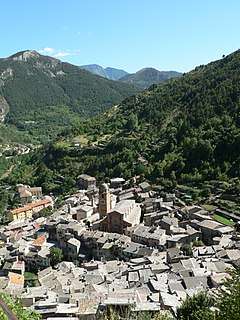Brigasc dialect
Brigasc is a dialect of the Ligurian language. It is spoken in Italy and France.
| Brigasc | |
|---|---|
| brigasc | |
| Native to | Italy, France |
Native speakers | approximately 1,000 |
Indo-European
| |
| Language codes | |
| ISO 639-3 | – |
| Glottolog | None |
| Linguasphere | 51-AAA-og |
Area of use
The Brigasc dialect is spoken in La Brigue (France) and Briga Alta (Italy) and some villages of the communes of Ormea and Triora. It is very close to Royasc dialect.
History
During the Renaissance the Ligurian language was spoken in all the territories of the Republic of Genoa: in the western area of this republic one of its groups (spoken mainly in the area between the Principality of Monaco and Sanremo) was called Intemelio.
The language spoken in the mountains around Briga was called Brigasc and received some influence from the Occitan language.[1][2][3]

Tenda is one of the alpine areas where Brigasc is still spoken
Some words in Brigasc
| Occitan[4] | Brigasc | Ligurian | Italian |
|---|---|---|---|
| labrena | labrena / cansëneštr | salamandra/scilvestru | salamandra |
| lhauç | jlaus o žlaus | lampu | lampo |
| besson, gemel | binèe | binélu | gemello |
| grolla | causée/cuusée | scarpa | scarpa |
| faudilh, faudal | fudìi | scussà | grembiule |
| ren | ren | ninte - nièn | niente |
| quauquarren | cücren | cuarcosa - carcosa | qualcosa |
| luenh | lögn | luntàn | lontano |
| a raitz | arè | du tüttu | completamente |
| Deineal, Chalendas | Dëneàa | Natale - Neà - Denâ | Natale |
| bealera | beàa/bearera | béu | canaletto |
| agulha | agüglia/agüya | aguggia | ago |
| mai | ciü - mai | ciü | più |
| c(l)han, pl(h)an | cian | ciàn | piano |
| fl(h)or | sciu(u) | sciùa | fiore |
| cl(h)au | ciau | ciave | chiave |
| uelh | ögl/öy | öggiu | occhio |
| pont | pont | punte | ponte |
| pòrc | porc | porcu | maiale |
| muralha, mur | muragn | meàia/miâgia | muro |
| escoba | dëvìa | spasùia/spasuìa | scopa |
| sentièr | dëraira | senté | sentiero |
| fea, feia | fea | pégua | pecora |
| abelha | abeglia/abeya | ava/avia | ape |
| aret | aré | mutòn/muntun | montone |
| volp, rainard | vurp / rinard | gurpe/vurpe | volpe |
| singlar | sëngriée | cinghiale | cinghiale |
| ruaa | ruà | burgà | borgata |
| femna, molher | femna | muié/mugê/dona | moglie |
| òme | om | maìu/mâiu | marito |
| marrit, chaitiu | marì | gramu | cattivo |
gollark: ····································.
gollark: .··
gollark: Just stop this madness and add THIS VERSION.
gollark: `pacman -S help-command`
gollark: It's a 421x421 PNG.
See also
References
- Werner Forner, "À propos du Ligurien Intémélien. La côte, l'arrière-pays", in Travaux du Cercle Linguistique de Nice, 7-8 (1985-1986), pp. 29-61; Werner Forner, "Areallinguistik I: Ligurien", in Lexikon der Romanistischen Linguistik (LRL), IV, Tübingen 1988, pp. 453-469 ; Werner Forner, "Géographie linguistique et reconstruction, à l'exemple du ligurien intémélien", in Actes du I Colloque International sur l'ancien provençal, l'ancien français et l'ancien ligurien, Nice sept. 1986 ("Bulletin du Centre de Romanistique et de Latinité Tardive"), Nice 1989, pp. 125-140; Werner Forner, "Fra Costa Azurra e Riviera: tre lingue in contatto", in V. Orioles, Fiorenzo Toso (a cura di), Circolazioni linguistiche e culturali nello spazio mediterraneo. Miscellanea di studi, Recco 2008, pp. 65-90.
- Jean-Philippe Dalbera, Les parlers des Alpes-Maritimes. Étude comparative. Essai de reconstruction. London 1994, Pubblicazione dell'Association Internationale d'Études Occitanes.
- Giulia Petracco Sicardi, E. Azaretti, "Studi linguistici sull'anfizona Liguria-Provenza", in Dizionario Etimologico Storico Ligure, Alessandria 1989, a pp. 11-62, di Giulia Petracco Sicardi, "Contributo alla definizione dell'anfizona Liguria-Provenza".
- Lorenzo Artusio, Piermarco Audisio, Gianni Giraudo, Eliano Macario, Disiounari Ousitan Roubilant - Roucavioun
Bibliography
- Fiorenzo Toso, Il brigasco e l'olivettese tra classificazione scientifica e manipolazioni politico-amministrative, in Intemelion. Cultura e territorio – Quaderno annuale di studi storici dell'Accademia di cultura intemelia, n. 14, anno 2008; website online (in Italian)
External links
This article is issued from Wikipedia. The text is licensed under Creative Commons - Attribution - Sharealike. Additional terms may apply for the media files.